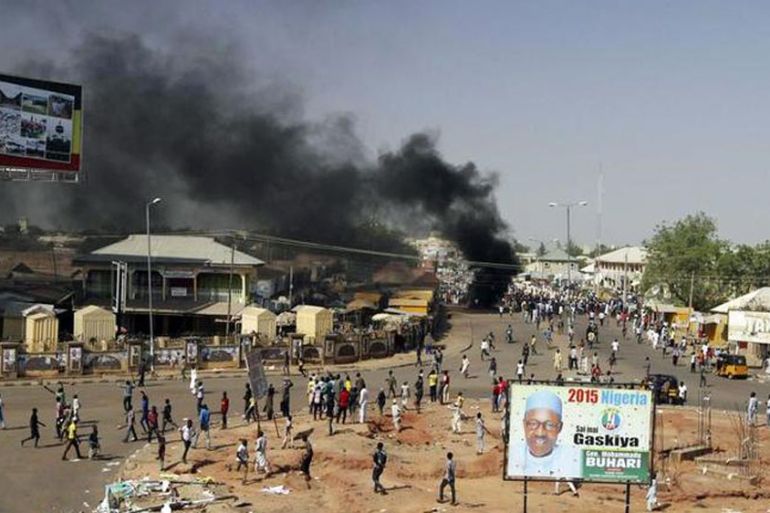Deadly blast at presidential rally in Nigeria’s Gombe
Female suicide bomber suspected to be behind explosion near stadium where president had just addressed election rally.

A car bomb that went off near a stadium in the northeastern Nigerian city of Gombe, a few minutes after President Goodluck Jonathan gave a speech at a party rally there, has killed at least three people and injured 18 others.
A female suicide bomber was suspected of being behind Monday’s blast, which comes less than two weeks before presidential elections are to be held.
Keep reading
list of 4 itemsUS House approves aid package worth billions for Ukraine, Israel
Will India’s election be free and fair?
Togo approves constitutional reform changing how president is elected
The explosion occurred about 1.5 kilometres from the venue, which Jonathan had just left, said Deputy Superintendent Fwaje Atajiri.
Two other suicide bombings in Gombe on Sunday injured a few people but killed only the bombers, he said.
A couple sharing a bicycle blew themselves up at a central traffic circle and a man blew himself up at a timber market. All three bombers died, Atajiri said.
Also on Sunday, another suicide bomber blew himself up outside the house of a legislator in the northeast Nigerian town of Potiskum, killing 10 people, two security sources told Reuters.
No one immediately took responsibility for the attack
‘Refrain from violence’
Meanwhile, the prosecutor of the International Criminal Court has urged all parties in Nigeria’s elections later this month to refrain from violence before, during and after the vote.
In a written statement, Fatou Bensouda said on Monday she would send a team to Nigeria before the February 14 election to “further engage with the authorities and encourage the prevention of crimes.”
Prosecutors at the Hague-based court already are conducting a preliminary probe into alleged war crimes committed by Boko Haram and by Nigerian security forces that could lead to a full-blown investigation.
The ICC has been looking into possible war crimes in Nigeria since 2010, but few believe it would be keen to take on another powerful politician after being forced to drop charges related to 2007 electoral violence against Kenyan President Uhuru Kenyatta in December.
Jonathan faces challenger Muhammadu Buhari, a northern Muslim, in an atmosphere of heightened regional, ethnic and sectarian tensions that many fear could to boil over into widespread violence.